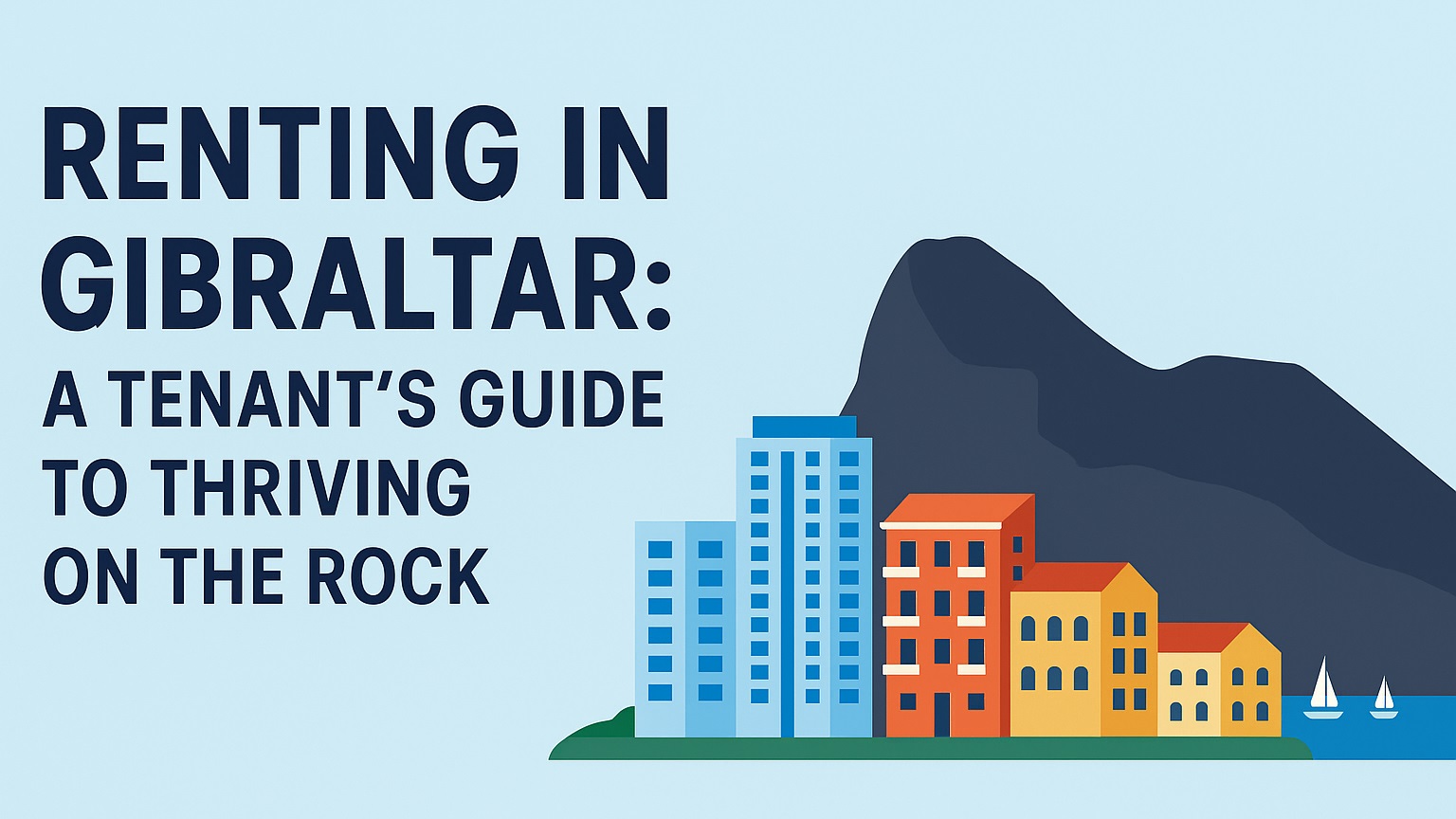Renting in Gibraltar: A Tenant’s Guide to Thriving on the Rock
Economy | 25 Apr 25, 00:00

...then this guide is for you—the Gibraltar tenant. Whether you’re new to the Rock, considering a move, or have been renting here a while, this blog dives into the essentials of navigating life as a tenant in Gib.
1. First Things First: Understanding the Gibraltar Rental Scene
Let’s set the scene. Gibraltar isn’t huge—just 6.7 square kilometres. That means limited space and high demand. The result? Rent isn’t cheap, and properties move fast.
Most available rentals are apartments—think studios, 1-3 bedroom flats, or shared accommodations. Townhouses and standalone homes exist but are rare and pricey. Expect modern buildings, often with sea views, balconies, and shared facilities like pools or gyms (if you’re lucky enough to score one in Ocean Village or EuroCity).
The key takeaway? Be ready to act fast and have your paperwork in order.
2. Paperwork: What You Need as a Tenant
You don’t need to drown in red tape to rent in Gibraltar, but you will need to show you’re a reliable tenant. Here’s a quick checklist:
-
Passport or ID – Valid and up to date. No exceptions.
-
Proof of Income – Payslips, employment contract, or bank statements.
-
References – From previous landlords, employers, or professional contacts.
-
Residency or Work Permit (if applicable) – Especially for non-EU/non-UK nationals post-Brexit.
If you’re already working in Gib, your employer might help with some of this (especially the ID card application). If not, expect to coordinate it yourself.
3. What You’ll Pay (And When)
Rent
Rents vary a lot depending on location and style:
-
Studio/1-bed: £900–£1,500/month
-
2-bed: £1,500–£2,500/month
-
Luxury options: £3,000+/month
Deposit
Standard is one month’s rent. In some cases—especially if you’re self-employed or new to the area—landlords might ask for more upfront.
Utilities
Not usually included. Budget around:
-
Electricity/Water: £100–£150/month
-
Internet: £30–£50/month
4. Choosing Where to Live
Gibraltar has distinct residential pockets. Here’s a quick vibe check:
-
Ocean Village: Modern, waterside, and a social hub. Great for professionals.
-
Midtown: Central, sleek, close to Main Street and offices.
-
Upper Town: Older buildings, quirkier layouts, better for those on a tighter budget.
-
South District: Quiet and family-friendly. Good for schools.
-
Catalan Bay/East Side: Beachy and peaceful, a bit out of the hustle.
Each area has pros and cons—your ideal spot depends on lifestyle, budget, and whether you’re walking to work or braving the bus.
5. Working with Agents vs Private Landlords
Most rentals in Gib go through estate agents. They:
-
Help you find listings
-
Handle contracts
-
Act as a middleman if issues come up
Some landlords rent directly, especially in the Upper Town or shared flats. This can be cheaper and more flexible, but be careful—always get things in writing.
Tip: Never transfer money without a signed tenancy agreement. Scams are rare in Gibraltar but not impossible.
6. Know Your Rights (And Responsibilities)
As a tenant in Gibraltar, your tenancy agreement is your rulebook. It should clearly state:
-
Rent amount and due date
-
Deposit terms
-
Duration of tenancy
-
Responsibilities for repairs and maintenance
Tenant Tips:
-
You're usually responsible for minor repairs, utilities, and keeping the place tidy.
-
The landlord handles structural issues and major appliance repairs.
-
You should be given 24-hour notice before any inspection or visit (unless it's an emergency).
If disputes arise, Gibraltar has legal channels you can use—but in most cases, good communication sorts things out before it gets messy.
7. Setting Up Your New Place
Once you’ve signed your lease, you’ll want to make your place feel like home. Here’s your new-tenant starter pack:
-
Utilities: Contact AquaGib (water) and the Gibraltar Electricity Authority (GEA) to get things in your name.
-
Internet: Choose from Gibtelecom, U-mee, or Sapphire. Most offer packages with TV and landline bundles.
-
Furniture: Many rentals are furnished, but if you need extras, check local Facebook groups or shops like IKEA (across the border in Spain).
8. Commuting from Spain: A Viable Option?
A lot of people work in Gibraltar but live just over the border in La Línea, Spain, where rent is significantly cheaper.
Pros:
-
Lower costs
-
More spacious homes
-
Access to Spanish lifestyle and shopping
Cons:
-
Border delays (especially during rush hour)
-
Different currency (euros)
-
Potential tax/residency complications
If you’re considering it, weigh the lifestyle perks vs. the daily grind of crossing the border.
9. How to Be a Stand-Out Tenant
Want to keep your landlord happy (and maybe even get your deposit back in full)? Here’s the playbook:
-
Pay rent on time.
-
Report issues early. Don’t wait until the leak becomes a flood.
-
Keep things clean. Basic upkeep goes a long way.
-
Be respectful of neighbours. Especially in apartment buildings.
-
Leave the property in good condition. Take photos when you move in/out for your records.
Good tenants get good treatment—and often better renewal deals.
10. Final Thoughts: Make the Most of Life on the Rock
Gibraltar is a unique place to call home. Yes, it’s small. Yes, rent is on the higher side. But you’re also living in a place where you can walk from work to the beach in 15 minutes, where monkeys might photobomb your daily walk, and where the sun shines over 300 days a year.
Renting here is more than just a roof over your head—it’s a launchpad for a life filled with culture, nature, and opportunity.
Bonus: Local Resources for Tenants
-
Gibraltar.gov.gi – Info on housing, immigration, and residency
-
Gib Messenger & Facebook Groups – Great for finding rooms or second-hand furniture